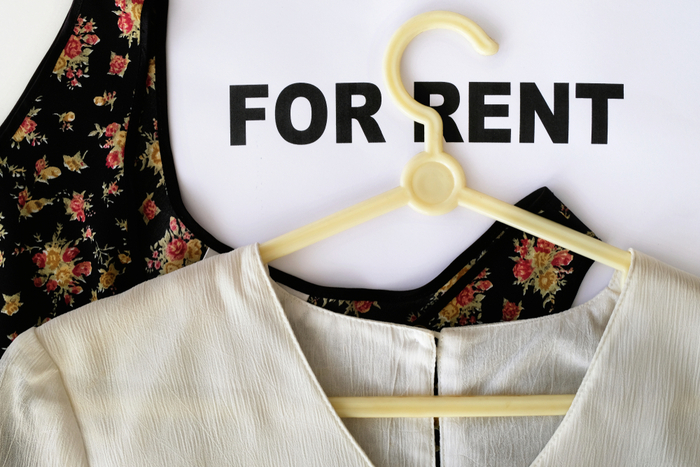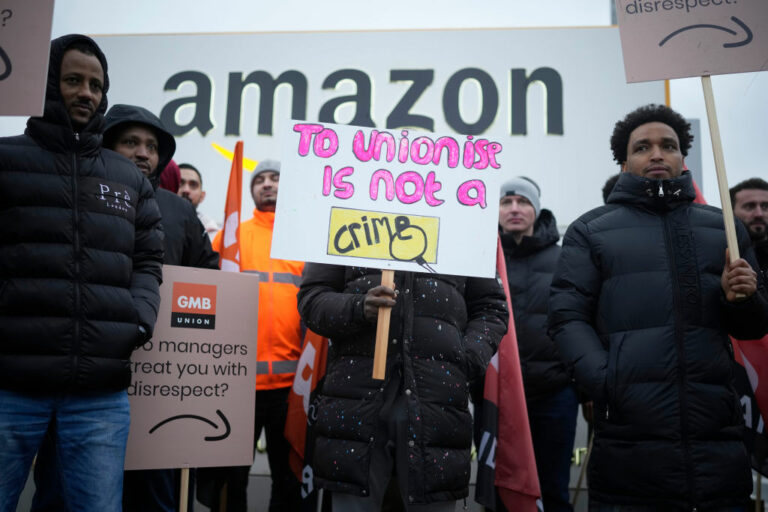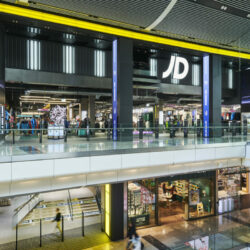With Brits disposing an estimated £140 million worth of clothing every year, it’s no surprise that clothing rental services are paving the way for a more sustainable approach to fashion and fashion waste.
According to GlobalData, the UK rental market value is expected to reach £2.3 billion by 2029, a stark increase compared to the estimated £400 million in 2019.
In Sweden, H&M is trialling a clothing rental service for members of its customer loyalty scheme, while in neighbouring Denmark, Ganni is launching its own Ganni Repeat rental service for customers.

While no major British fast fashion retailer has tapped into rental services as yet, UK consumers already have access to the likes of My Wardrobe HQ, Hurr Collective, Rent The Runway, and several others.
As a worthwhile alternative to investing in fast fashion, the premise behind wardrobe rentals offers subscription-based and pay-per-hire services operated by companies owning stock and leasing pieces at a discounted rate for a limited period of time.
With the Covid-19 pandemic forcing the temporary closure of stores for much of the spring, the UK’s rental market was also at threat as Brits halted plans to go out and demand for occasionwear dropped. For example, fashion retailer Quiz said this month that its sales dropped 77 per cent due to a decline in occasionwear.

However, since stores and some hospitality offerings reopened, demand for clothing other than loungewear has gone up – with some retailers posting encouraging trading updates with signs of recovery.
Founder of rental app By Rotation, Eshita Kabra-Davies, told Retail Gazette that while rental transactions were not occurring during the Covid-19 lockdown, By Rotation experienced “a period of immense user and listings growth”.
“Our community grew by 100 per cent since March 23, 2020 and our listings grew by 130 per cent as more users were very engaged on the app, organising their wardrobes,” she said.
“Since mid-July, with social distancing measures easing, our rental volumes bounced back by 180 per cent.
“The interest to consume fashion more sustainably and dress up elaborately as we finally have the opportunity to go out has been extremely positive.”
Over the last couple of years, fashion rental services in the UK have risen in popularity. Rent the Runway introduced the concept to the retail sector over a decade ago, and the start-up’s success has led to a slew of similar businesses and services propping up.
https://www.instagram.com/p/CE-QuzqHFhi/?igshid=5iapq7071hnw
While the concept of renting clothes isn’t new, as men have been hiring suits for years and special occasion dresses have similarly long been available to rent – what is new is the rise in renting casual wear.
As sustainability continues to become a major focal point and demand from fashion consumers, the likes of Hurr Collective and By Rotation are being marketed as the ultimate circular solution. The businesses offer consumers a space to upload items from their own wardrobe onto the platform, enabling the monetisation of unworn clothing.
Luxury department store Selfridges has gone a step further by launching its first in-house and online wardrobe rental service last month, in partnership with Hurr Collective. The offering is part of Selfridges’ wider sustainability initiative, Project Earth, which aims to change the way consumers shop when it comes to fashion.
Selfridges sustainability group director Daniella Vega told Retail Gazette that the retailer wants to provide customers with “as many ways to shop responsibly as possible, without losing any of the fun and sparkle of the experience”.

“Earlier this year we partnered with Hurr to launch the UK’s first in-store fashion rental pop up,” Vega said.
“As part of our Project Earth initiative aimed at changing the way we shop, we have since launched our own collection with Hurr, meaning customers can now rent from a carefully curated collection of pieces from the Selfridges archive.
“As well as renting an outfit for a special occasion, you can also now refill your favourite beauty products, buy pre-loved collections and repair your most-treasured items all at Selfridges, helping us to reduce waste whilst extending the lifespan of many pieces.”
Hurr Collective chief executive Victoria Prew added that partnering with Selfridges was “game changing”.
“The pop-up has made shopping sustainably easier than ever and will also drive positive long-lasting change in how the lifespan of a garment is viewed,” she said.
“Renting allows customers to access high fashion at fast fashion prices. Our goal is to slow down fast fashion and remove the need to buy wear-it-once items.
“Renting allows customers to access high fashion at fast fashion prices”
“The Hurr x Selfridges Rental Collection is the perfect hybrid – providing the need for newness (that the fast fashion model relies upon) in a more affordable, sustainable way.”
Meanwhile, UK charity Oxfam is celebrating its Second Hand September campaign this month by encouraging consumers to pledge to shop only second hand for 30 days or more.
Oxfam head of audience & strategic planning, Fee Gilfeather, told Retail Gazette that clothing rental services are “a great way to encourage shoppers to think more sustainably”, giving clothes a longer life and keeping them out of landfill.
“Oxfam’s Second Hand September campaign aims to challenge people to manage their wardrobes more sustainably,” she explained.
“The campaign is proving incredibly popular in its second year which suggests that shoppers are open to thinking differently about their fashion choices.
“With 13 million garments going into UK landfill every week, any initiative which gives clothes a chance to be worn again is a positive move.”
Meanwhile, My Wardrobe HQ co-founder Tina Lake argued that clothing rental services were beneficial for premium and luxury brands looking to tap into a millennial customer base “who can’t generally afford luxury brands when young”.
“Through rental, they can become engaged with the brand and once they have a disposable income, they’re invested and loyal to that brand,” she said.
“Fashion rental is a natural addition to the sharing economy as consumers are less interested in ‘owning’ stuff, instead they want to experience, which is perfect for fashion rental.
“Our pop up in Liberty in February, pre Covid, demonstrated the interest and appetite for fashion rental. In the Instagram era, people don’t want to be seen in same thing twice.”
While clothing rental services provide step a forward in tackling the fashion and retail industries’ sustainability problem and offer a more circular economy, sizing is not yet as varied as it should be. The limited size ranges suggests that greater inclusivity is still needed.
Even so, if the fashion ecosystem wants to become more sustainable, retailers may have to adopt a more conscious approach to consumption. This includes a change in consumer behaviour and the introduction of a radically new business model.
Instead of venturing out into rental, retailers might need to consider other ways into persuading consumers to buy less, perhaps by incorporating Oxfam’s Second Hand September campaign as a long-term principle.
Click here to sign up to Retail Gazette’s free daily email newsletter


















